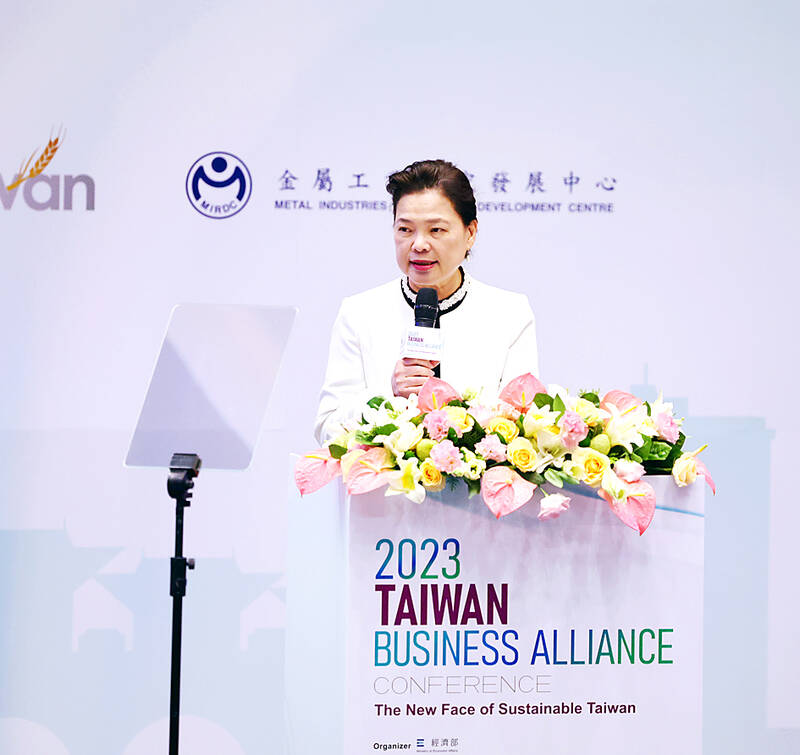The government’s three major “Invest in Taiwan” programs are expected to attract NT$230 billion (US$7.33 billion) in investment this year, creating an estimated 19,000 jobs, the Ministry of Economic Affairs said on Monday.
As a result, the three programs — the Action Plan for Welcoming Overseas Taiwanese Businesses to Return to Invest in Taiwan, the Action Plan for Accelerated Investment by Domestic Corporations, and the Action Plan for Accelerated Investment by Small and Medium-sized Enterprises — are expected to reach an aggregate investment of NT$2.4 trillion as of the end of this year since their launch in 2019, Minister of Economic Affairs Wang Mei-hua (王美花) said.
Regarding foreign investment in Taiwan, Wang said Dutch semiconductor equipment maker ASML Holding NV is building its new factory in New Taipei City’s Linkou District (林口) starting this year, and Japanese electronics and semiconductor company Tokyo Electron Ltd is completing its operations center in the Southern Taiwan Science Park (南部科學園區) in Tainan by the end of this year.

Photo: CNA
Japanese semiconductor material provider Fujifilm Holdings Corp plans to construct a new facility in Hsinchu and expand existing production lines in Tainan, Wang said.
Other than semiconductor-related foreign investment, Wang said that the expansion of the offshore nacelle assembly facility of Siemens Gamesa Renewable Energy SA in Taichung — the first outside Germany — was completed in December last year, with operations slated to start in the second quarter of this year.
The minister said the edge that Taiwan’s semiconductor industry has in advanced manufacturing and the leading foreign corporations’ investment in the nation have driven growth in the IC design, packaging and testing supply chain, making Taiwan more indispensable.
The government has also tabled policy measures — Article 10-2 of the Statute for Industrial Innovation (產業創新條例) that grants tax credits and the Taiwan Chip-based Industrial Innovation Program starting this year — to help the companies tap into the advanced manufacturing, research and development, and the application of artificial intelligence chips, Wang said.
Together with TSMC’s advanced manufacturing technology, the addition of leading international materials and equipment companies such as ASML, Tokyo Electron, Applied Materials Inc and Lam Research Corp would provide local manufacturers and suppliers a good opportunity to join the supply chain, “making it harder for Taiwan to be replaced,” she said.
Asked about US officials’ visiting Taiwanese semiconductor suppliers next month to discuss new export controls, Wang said the visit is similar to one in October last year, aiming to help Taiwanese suppliers better understand the content of US export controls on China, with the regulations totaling about 400 pages.

Taiwan Semiconductor Manufacturing Co (TSMC, 台積電) secured a record 70.2 percent share of the global foundry business in the second quarter, up from 67.6 percent the previous quarter, and continued widening its lead over second-placed Samsung Electronics Co, TrendForce Corp (集邦科技) said on Monday. TSMC posted US$30.24 billion in sales in the April-to-June period, up 18.5 percent from the previous quarter, driven by major smartphone customers entering their ramp-up cycle and robust demand for artificial intelligence chips, laptops and PCs, which boosted wafer shipments and average selling prices, TrendForce said in a report. Samsung’s sales also grew in the second quarter, up

On Tuesday, US President Donald Trump weighed in on a pressing national issue: The rebranding of a restaurant chain. Last week, Cracker Barrel, a Tennessee company whose nationwide locations lean heavily on a cozy, old-timey aesthetic — “rocking chairs on the porch, a warm fire in the hearth, peg games on the table” — announced it was updating its logo. Uncle Herschel, the man who once appeared next to the letters with a barrel, was gone. It sparked ire on the right, with Donald Trump Jr leading a charge against the rebranding: “WTF is wrong with Cracker Barrel?!” Later, Trump Sr weighed

LIMITED IMPACT: Investor confidence was likely sustained by its relatively small exposure to the Chinese market, as only less advanced chips are made in Nanjing Taiwan Semiconductor Manufacturing Co (TSMC, 台積電) saw its stock price close steady yesterday in a sign that the loss of the validated end user (VEU) status for its Nanjing, China, fab should have a mild impact on the world’s biggest contract chipmaker financially and technologically. Media reports about the waiver loss sent TSMC down 1.29 percent during the early trading session yesterday, but the stock soon regained strength and ended at NT$1,160, unchanged from Tuesday. Investors’ confidence in TSMC was likely built on its relatively small exposure to the Chinese market, as Chinese customers contributed about 9 percent to TSMC’s revenue last

LOOPHOLES: The move is to end a break that was aiding foreign producers without any similar benefit for US manufacturers, the US Department of Commerce said US President Donald Trump’s administration would make it harder for Samsung Electronics Co and SK Hynix Inc to ship critical equipment to their chipmaking operations in China, dealing a potential blow to the companies’ production in the world’s largest semiconductor market. The US Department of Commerce in a notice published on Friday said that it was revoking waivers for Samsung and SK Hynix to use US technologies in their Chinese operations. The companies had been operating in China under regulations that allow them to import chipmaking equipment without applying for a new license each time. The move would revise what is known